|
|
|
Sort Order |
|
|
|
Items / Page
|
|
|
|
|
|
|
| Srl | Item |
| 1 |
ID:
185091
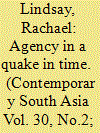

|
|
|
|
|
| Summary/Abstract |
This article explores agency through humour and time amongst a group of Pakistani young men who reside, or recently resided, in a refugee shelter for unaccompanied minors in Athens, Greece. It asks how their jokes about alternate futures might challenge the slow, structural violence which places these young men on the margins of society in terms of work, space, and temporality. Despite a lack of anthropological work on humour, particularly amongst migrant communities, this article takes up humour as an analytical tool due to its pervasive presence in the shelter and its challenge to the discourse of victimhood of migrant children. I ultimately argue that conventional theories about the role of humour fail to fully account for the temporalities that these jokes around futurity evoke. This article also sheds light on the various constructs of time at play within the lives of these young men and how these are disrupted in the moment of the joke. It asks what modalities of agency emerge during these jokes when we employ Deleuze’s non-linear syntheses of time and seeks, ultimately, to look beyond conventional assumptions of youth agency and structural inequality, and to question the premises upon which such conventions are built.
|
|
|
|
|
|
|
|
|
|
|
|
|
|
|
|
| 2 |
ID:
189993
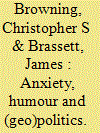

|
|
|
|
|
| Summary/Abstract |
Humour is usually overlooked in analyses of international politics, this despite its growing prevalence and circulation in an increasingly mediatised world, with this neglect also evident in the growing literature on ontological security and anxiety in IR. Humour, though, needs to be taken seriously, crossing as it does the high-low politics divide and performing a variety of functions. In the context of the Covid pandemic we argue that the link between humour and anxiety has been evident in three notable respects: (i) functioning as a (sometimes problematic) form of stress relief at the level of everyday practices of anxiety management, (ii) working to reaffirm biographical narratives of (national) community and status and (iii) most significantly for IR, as a form of anxiety geopolitics.
|
|
|
|
|
|
|
|
|
|
|
|
|
|
|
|
| 3 |
ID:
137731
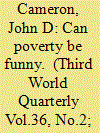

|
|
|
|
|
| Summary/Abstract |
This article examines the use of humour as a strategy to promote increased public engagement in the countries of the global North with issues of global justice. The central argument of the article is that humour can be both an ethical and an effective way of attracting and sustaining public engagement in struggles for global justice. There are risks and limits to the use of humour to represent issues of poverty and injustice but, given low levels of public engagement in these issues in the countries of the global North, humour is a risk worth taking.
|
|
|
|
|
|
|
|
|
|
|
|
|
|
|
|
| 4 |
ID:
183700
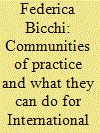

|
|
|
|
|
| Summary/Abstract |
This article argues that communities of practice (CoPs) provide IR with a unique way to understand how a small group of committed people can make a difference to international politics. The point is addressed in three steps. First, the article advances our understanding of how CoPs work. While at its core a CoP is a group of people brought together by a practice they enjoy, a CoP also shares a sense of timing, placing, and humour. These aspects help the group anchor, refine, and innovate their practice in the face of challenges and uncertainty. Second, the article contrasts the analysis of CoPs with other IR approaches, especially institutional analysis, network analysis, and epistemic communities, to show how CoPs supplement them. Third, the article illustrates the argument with the example of the EU foreign policy towards the Israeli-Palestinian conflict. It concludes by suggesting that a CoP's perspective not only helps IR better understand informal politics, but also opens up conversations across disciplines.
|
|
|
|
|
|
|
|
|
|
|
|
|
|
|
|
| 5 |
ID:
092330
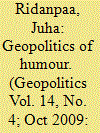

|
|
|
|
|
| Publication |
2009.
|
| Summary/Abstract |
Humour and cartoons are commonly perceived as practices of innocent entertainment, but the crisis following the publishing of twelve cartoons of the prophet Muhammed in the Danish newspaper Jyllands-Posten finally proved what serious matters popular culture, cartoons and humour can be. One repercussion of this notorious cartoon crisis was the publication in Kaltio, a minor cultural journal produced in northern Finland, of a comic strip in which various questions concerning the Muhammed cartoon episode and the political hypocrisy of the Finnish government were discussed satirically. This precipitated another, albeit minor, crisis which was noted widely around the world. Through these two interlinked incidences, the present paper discusses how humour functions as a 'tool' giving impetus to various forms of geopolitical processes and discussions in a range of contextual circumstances and at different spatial levels, resulting in both politically affirmative and destructive effects. It also discusses how the geopolitical order, discourses and codes can divert the reception and interpretation of humour.
|
|
|
|
|
|
|
|
|
|
|
|
|
|
|
|
| 6 |
ID:
183376


|
|
|
|
|
| Summary/Abstract |
Ali Salem was an independent intellectual, unbound to the regime or political parties. He believed that the intellectual must also be independent from the public. It does not mean he must be detached from society or elevated above it, but that he must avoid flattering it. Over thirty years of literary activity, Salem published 27 plays and hundreds of humoresques and short stories, which were collected in 15 books. He also published opinion pieces in the Egyptian press and periodicals. Salem was an uncompromising social and political whip, who criticized Egypt’s society and regime in the context of a political culture that limits freedom of expression and impedes the expression of views that contradict those of the autocratic ruler. The Article will focus on the witty humor Salem used in both his satires and plays to sharply criticize the socio-political maladies from which Egyptian society suffers and at the same time it served as a means to introduce to Egyptians the problems of their society in a way that would make it easier for them to internalize them, shake them out of their apathy and urge them to act in order to improve their lives for the better.
|
|
|
|
|
|
|
|
|
|
|
|
|
|
|
|
| 7 |
ID:
123698


|
|
|
|
|
| Publication |
2013.
|
| Summary/Abstract |
Model United Nations (MUN) is a simulation in which students take on the roles of ambassadors to the United Nations, engaging in debate on 'real' issues from the perspective of their assumed national identities. This paper, based on a year of ethnography and interviews of a college-level MUN team, examines the role of humour in producing particular geopolitical imaginations among those participating and also in producing the MUN assemblage itself. Key here is the circulation of affects among participants' bodies, producing an orientation among them that facilitates debate and consensus-building. This finding is seen as a corrective to past work on geopolitics and humour, which has tended to emphasise irony and satire, as well as mass-mediated humor.
|
|
|
|
|
|
|
|
|
|
|
|
|
|
|
|
| 8 |
ID:
192319
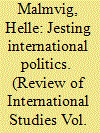

|
|
|
|
|
| Summary/Abstract |
Humour has recently emerged as an important research topic in International Politics. Scholars have investigated how states and state leaders practice humour as part of their diplomatic exchanges, in misinformation campaigns, and nation-branding. Important knowledge has been gained as to how humorous practices partake in constituting identities, managing recognition, and international anxieties or contesting global orders. Yet, little attention has been devoted to interrogating the risk that humorous practices may give rise to in international politics, to the underside of humour's productive power. This article aims to begin unpacking these risks both theoretically and empirically. To do so, it engages with the critical thinking on humour by Kierkegaard and Foster Wallace in particular, suggesting three challenging implications: (1) humorous entrapments; (2) facile forms of detached engagement; and (3) ambiguous blurring of fiction and reality. It then shows how these unfold empirically in: Iran's meme war with the US, a Yes Men's parody during COP15, and the Pyongyang Nuclear Summit, developing a three-pronged analytical strategy for studying humorous practices and their different relations to formations of power/knowledge.
|
|
|
|
|
|
|
|
|
|
|
|
|
|
|
|
| 9 |
ID:
168585


|
|
|
|
|
| Summary/Abstract |
Every day, migrants from El Salvador, Guatemala, and Honduras risk their lives attempting to reach the US. Accordingly, accounts of migration from Central America are often framed by tragedy and violence, as migrants increasingly confront new security and border control practices in Mexico and the US, in addition to other forms of brutality on their journeys. Though accurate, these descriptions grounded in tragedy obscure other everyday experiences of migrants in transit, which, as I show here, are punctuated not only by brutality and violence but also by play and laughter. Drawing from ethnographic fieldwork in migrant shelters across Mexico and the US, I argue that humour represents a crucial, yet neglected, detail in the geopolitics of international migration. I develop the shared and collective aspects of joking and laughter in migrants’ journeys by detailing how Central American migrants deploy humour as a shared mechanism to cope with their vulnerability while generating spaces of collective solidarity, as they join together in making light of their illegality and immobility in transit. Ultimately, I assert, attention to humour in the study of the geopolitics of migration reveals the complexity of migrants’ experiences along their journeys, experiences that transcend overly simplistic accounts of brutality and violence to better understand migrants’ everyday lives in transit.
|
|
|
|
|
|
|
|
|
|
|
|
|
|
|
|
| 10 |
ID:
158084
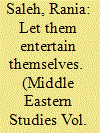

|
|
|
|
|
| Summary/Abstract |
This article examines the issues underlying the downfall of the Mubarak regime from the perspective of Egyptian cartoonists. A total of 2734 political cartoons published in five leading newspapers between January 2010 and February 2011 are analyzed. Because they form a significant part of the cultural context within which these cartoons are created, popular political jokes are also referenced. The study identifies political stagnation, domestic issues and corruption as the three most significant issues that paved the road to the fall of Mubarak.
|
|
|
|
|
|
|
|
|
|
|
|
|
|
|
|
| 11 |
ID:
181534
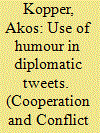

|
|
|
|
|
| Summary/Abstract |
Today diplomacy increasingly relies on tweets. Yet, as tweets only allow for 280 characters, statements must be brief and impactful, which encourages the use of humour in conveying one’s message. This article scrutinizes irony and ridicule in diplomatic interactions. Even though these forms of humour may antagonize parties and even turn issues into a security concern, this article points out that they also have an affiliative aspect and could play a conflict-mediating role. Because humour, especially irony, is easy to misunderstand (especially in cross-cultural settings), many warn against using them in diplomatic exchanges. Nevertheless, I will argue that they are ideal for expressing multi-layered messages, enabling the speaker to rely on what is often called ‘constructive ambiguity’, which is often useful in diplomatic conduct. Two case studies illustrate the argument. The first focuses on cartoons ridiculing President Wilson in the early 20th century for his reluctance to commit the US to join WWI (suggesting that cartoons of the time might be predecessors of today’s tweets), and the second on tweets published by the British Embassy in London apropos of the Skripal case (offering an example how humorous tweets can convey multi-layered, complex messages).
|
|
|
|
|
|
|
|
|
|
|
|
|
|
|
|
| 12 |
ID:
087719


|
|
|
|
|
| Publication |
2009.
|
| Summary/Abstract |
As post-military 'democratic' regimes across Africa perpetuate norms and practices that were characteristic of the previous openly authoritarian era, humour and ridicule have emerged as a means through which ordinary people attempt to deconstruct and construct meaning out of a reality that is decidedly surreal. In Nigeria jokes serve a double function as a tool for subordinate classes to deride the state (including its agents) and themselves. Jokes are therefore a means through which an emergent civil society, 'behaving badly', subverts, deconstructs, and engages with the state. Yet, for all its significance as a form of agency, humour has been neglected in the civil society literature, partly because of the mentality which frames civil society in terms of organizations (humour is not organized), and partly because of its almost exclusive attention to the 'civil' attributes of civil society (humour is, inter alia, rude). This article argues for incorporating humour into the civil society discourse, and suggests that doing so will enrich civil society analysis by focusing on both the constructions of sociality and their associated politics, and the hidden spaces in which most of visible political action originates.
|
|
|
|
|
|
|
|
|
|
|
|
|
|
|
|
| 13 |
ID:
182489


|
|
|
|
|
| Summary/Abstract |
We examine some vehicle writings that convey slang, humour and witticism to the readers of the vehicle insignia because none of the previous researchers on vehicle writings have focused on this subject matter. We adopt the ethnography of communication and our data comprised 15 randomly selected vehicle writings. We argue that the humour-laced messages convey profound messages, which serve as tension-dousing artefacts intended to be amusing and easily enjoyed by the users and some of the reading public. We submit that language use in social interactions can help douse tensions in societies where acute poverty and unrest are prevalent.
|
|
|
|
|
|
|
|
|
|
|
|
|
|
|
|
|
|
|
|
|